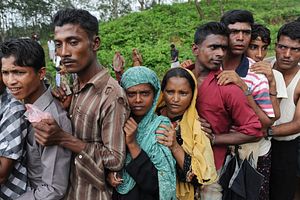On May 28, as the latest skirmish unfolded between Bangladesh’s Border Guard Bangladesh (BGB) and Myanmar’s Border Guard Police (BGP), leaving one BGB member dead, the uneasy relationship between the two neighbors again came to the fore. Although Bangladesh is mostly surrounded by India, it does share a short border with Myanmar, the importance of which has increased dramatically over the past decade. Despite the recent spate of unrest, Bangladesh is eager to resolve the simmering crisis, especially given Myanmar’s strategic importance as the gateway to China and ASEAN, and as a potential long-term supplier of natural gas.
Dawn of Democracy in Myanmar
Since the beginning of its pro-democracy reform in 2011, the Myanmar government led by Thein Sein has undertaken a series of development initiatives, in the process creating an environment more conducive to democracy. With an election scheduled for 2015, investor optimism is high and money is pouring into the new “Wild Wild West” of the global economic landscape. Myanmar has a rich supply of natural resources that remain tapped, while labor costs remain affordable. The military-backed government has also invested heavily in infrastructure projects for capacity building, earmarking special economic zones for foreign funded industrial complexes.
A democratically elected government is expected to come to power in 2015, which will accord Myanmar enhanced credibility amongst its fellow nations. As a result, the flow of Foreign Direct Investment (FDI) is expected to see a major increase, as investors will want a piece of the resource-rich emerging market. Although FDI as of 2011 stood at $2 billion, rising to $2.7 billion in 2013, investment is expected to increase further over the coming years.
Political Impasse in Rakhine Region
Myanmar’s restive Rakhine region bordering Bangladesh has been in constant tumult over the last couple of years, instigated by the local Buddhist clergy. The situation has been aggravated to such an extent that many local Rohingya (Muslim) communities have been forced to flee to Bangladesh. Despite persistent calls from the international community to stem widespread atrocities against the Rohingya, the Myanmar government has refused to pay heed.
The Rohingya issue has been a major irritant for Bangladesh, especially given the pressure of accommodating a rising number of refugees. At times, border tension has flared between the neighbors.
Bangladesh: Closely Monitoring
Given this backdrop, Bangladesh, as a neighbor and major stakeholder, is concerned about Myanmar’s ascendance. The opening up of Myanmar’s economy means competition for investment and export markets. As new investments pour into Myanmar, it comes at the expense of funds to close competitors like Bangladesh. Bangladesh’s recent political upheaval means that many investors are unsure of its viability as an investment destination, and instead would want to invest in alternate destinations. Myanmar, having rich deposits of natural resources, cheap labor, and most importantly political stability, could be a worthwhile choice. These conditions make Myanmar an ideal destination for future investments.
Bangladesh’s greatest source of foreign currency, the Ready-Made Garments (RMG) sector (valued at $23 billion in fiscal 2013), has faced many challenges since 2013. With several industrial accidents disrupting the sector in 2013, international buyers are increasingly looking for alternative suppliers. Amid the uncertainty, India has again re-emerged as the second-highest apparel exporting nation after China, overtaking Bangladesh. Myanmar, with its inexpensive labor costs, could pose a challenge to Bangladesh’s dominant apparel market position in two to three years’ time.
The Rohingya crisis has a spill-over effect on Bangladesh-Myanmar relations. The Myanmar government claims Rohingya to be illegal Bangladeshi immigrants, an assertion vehemently denied by Bangladesh. There are also allegations by Myanmar accusing Bangladesh of harboring Rohingya separatists.
The Bangladesh prime minister’s latest visit to China last week further consolidated already strong trade relations between the countries. During the visit, several MOUs were signed to facilitate Chinese investment and technical support in developing several large-scale infrastructure projects in Bangladesh. Mitigating the existing trade deficit with China, by ensuring quota- and tariff-free access to the burgeoning Chinese market, remains a vital goal. Concurrently, talks were underway to establish a road link between Bangladesh and China in order to boost bilateral trade. However, the road network would have to go through Myanmar, which has no great interest in accommodating the request.
Looking Ahead
Bangladesh must engage with Myanmar, but should stand firm in order to protect its interests. As the Myanmar economy grows. Bangladesh should look to reap the benefits by setting up cross-border businesses. Persuading Myanmar to allow cross border transit to China should also be an important part of Bangladesh’s agenda. Resolving the Rohingya crisis is of paramount importance is Bangladesh is to achieve a favorable long-term relationship with Myanmar. To this end, the Bangladeshi government should play a significant role in consulting with international stakeholders to ensure regional peace and economic integration.
Zahedul Amin is the director of Finance & Strategy at LightCastle Partners, an emerging market specialized business planning and intelligence firm. (www.lightcastlebd.com)

































